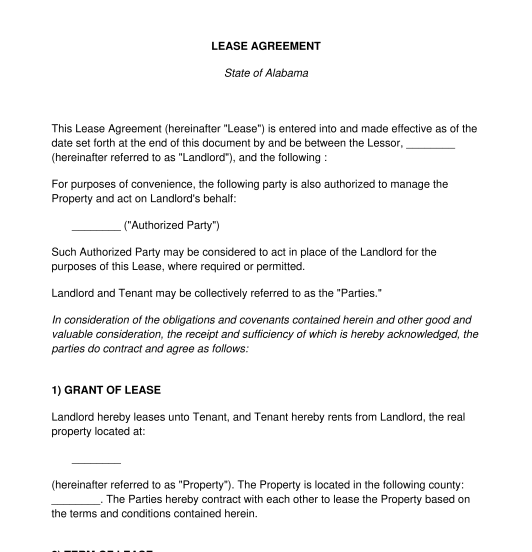 10/02/2025
10/02/2025

Answer a few questions and your document is created automatically.

Your document is ready! You will receive it in Word and PDF formats. You will be able to modify it.




Rating: 4.8 - 237 votes
Download a basic template (FREE) Create a customized documentA residential lease agreement is a document used when someone, known as a tenant, would like to rent a residential property from a landlord. The residential lease agreement acts as a binding contract which gives the person the right to live in the landlord's residential property in exchange for paying rent. For more information about residential leases, please refer to the guide Top Ten Essential Elements of a Residential Lease.
There are two main types of residential leases. The first type of residential lease is a standard residential lease, where the tenant rents the property with no intent to buy it from the landlord at any point.
The other type of residential lease is a residential rent to own agreement. This is a document used by a potential buyer of a property to enter into a rental lease agreement with the landlord intending to buy the property at the end of the lease. It arranges both the rental relationship as well as the potential sale of the property to the tenant at the end of the lease.
Though both documents are meant to facilitate a landlord and tenant arrangement, they are used in different situations. A residential lease agreement is used when the tenant plans to live in the space they are renting. A commercial lease is used when the tenant plans to do business in the space they are renting. Each type of lease includes provisions specific to each of these purposes.
No, it is not mandatory to have a residential lease agreement. A landlord and tenant are free to enter into a rental relationship without creating a formal contract memorializing the arrangement. However, using a written residential lease agreement is highly advisable because it protects both the landlord and the tenant. By making each party's rights and responsibilities clear and upfront in writing, potential misunderstanding is avoided.
A security deposit is money paid from the tenant to the landlord at the start of the lease. This money is often the equivalent of one month's rent and is meant to be used by the landlord to cover any damages that happen to the property through the fault of the tenant. At the end of the lease, if there is no damage, the security deposit is returned to the tenant.
Renter's insurance is a type of insurance policy that is designed to protect tenants who are renting their home. It typically covers their personal belongings, liability protection, and other living expenses if something happens that makes their rental property uninhabitable. Some landlords require that tenants obtain renter's insurance as a condition of the tenant renting the property.
There is no maximum or minimum amount of time that a residential lease agreement can last. The most common lengths of time are either a one-year lease or a month-to-month lease that renews at the beginning of each month.
When the residential lease agreement is written and all the relevant information has been included, both the landlord and the tenant should sign and date the document. The parties should each keep a copy of the agreement for reference and in case of future dispute. The signing does not need to be witnessed, and the document does not need to be notarized for it to go into effect.
A valid residential lease agreement must contain at least the following mandatory clauses:
In addition to the above mandatory clauses, the following information may also be included:
Lease Agreements in the United States are generally subject to the laws of individual states.
The Environmental Protection Agency governs the disclosure of lead-based paint warnings in all rentals in the states. Distinct from that, however, required disclosures and lease terms will be based on the laws of the state, and sometimes county, where the property is located.
You fill out a form. The document is created before your eyes as you respond to the questions.
At the end, you receive it in Word and PDF formats. You can modify it and reuse it.
Guides to help you
Residential Lease Agreement - FREE - Sample, template
Country: United States